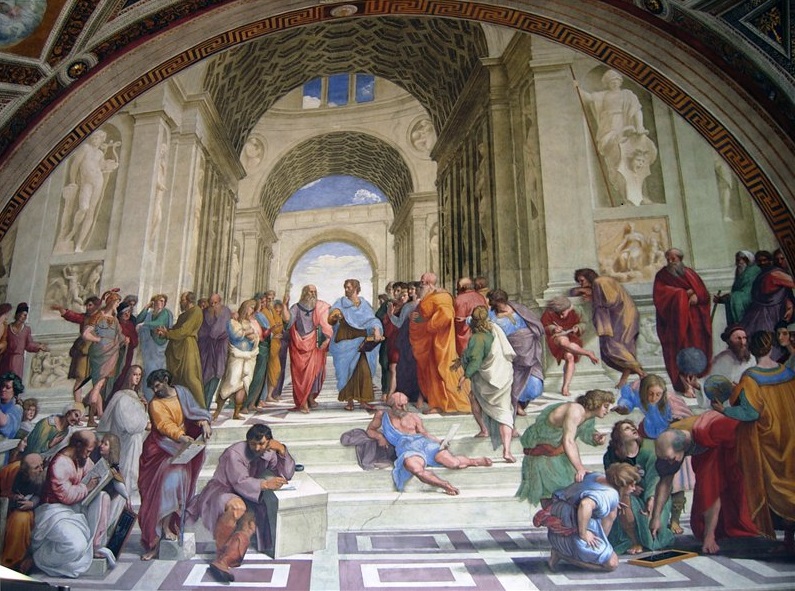
Not too long ago, I acquired a reproduction of Raphael’s The School of Athens printed onto a stretched canvas. Being an admirer of the visual arts, particularly of those that are more realistic and require no great imagination from me, I displayed the work prominently in my bedroom, so I might arise in the mornings and gaze upon the two greatest thinkers in history debating on subjects of nearly infinite importance.

It became a habit to meditate on the meaning of the painting, for to meditate on a picture of these philosophers was much less demanding than meditating upon their actual works, which, as some may have discovered, are copious, and often contain big words. There is much worth appreciating in The School of Athens, most of all the irony that its mere existence implies: that Aristotle was closer to Raphael’s heart than Plato, for Plato would never have placed too much value on an illustration of a few babbling men, who themselves are just shadows of higher realities. It was Aristotle who believed there to be great joy in visual art, that is, in the observation of imitations, and Raphael must have agreed, or he would not have created his work; and I, further, must also agree with Aristotle, or I would not look at my reproduction painting with such unhindered gratification.
One evening, as I again surveyed my highly favored decoration, I realized both Plato and Aristotle possessed beards. Similarly, nearly everyone in the painting who sported a grave and intellectual expression also had a beard. With no small amount of grief, I touched my chin and realized I had unwittingly been depriving myself of a consummate intellect for a decade or so by making regular use of the razor! Such foolishness, once discovered, must be cut off at the source. At that time, not too long ago, I determined to grow a beard of my own, and so join the ranks of Plato, Aristotle, Marcus Aurelius, Cato, and Dostoevsky.
Within a week or so, I had acquired my beard, and with it the intelligence I had so desired. As I began to pass the hours stroking it, I dedicated my mind to contemplating how much smarter I was now. I decided to read a book, a difficult one, a tome which no shorn man could possibly comprehend. I chose for myself On Grammatology, by Jacques Derrida. Then, I met my downfall, for I came to realize that my beard had granted me no intelligence whatsoever, but only the conceit of intelligence, something which itself is by no means a benefit, but a consummate danger.
Beard Of Folly
This lesson, then, I have learned: Beards do not make one an intellectual; neither do political parties or social involvements. So often I have encountered people who find themselves to be on the cutting edge of educating the human race; and for what reason? From where do they achieve this opinion of themselves? Most often from the fact that they belong to trendy political movements. One might declare himself pro-gay marriage, thus also declaring himself quite enlightened and accepting. Similarly, one might deem himself a libertarian and think himself vastly more open-minded than his knuckle-dragging conservative parents. If one joins the Democratic party, he has become by virtue of his membership a deeply compassionate individual, just as some by joining the Tea Party think themselves to be rugged individualists. Just as a beard once granted me the conceit of intellect, but not the reality of intellect, so one’s involvement in certain movements and factions grants him only the conceit of compassion, of enlightenment, of acceptance, while depriving him of anything truly of the sort.
People associate with groups not because they possess a deep philosophical agreement with them, nor because they believe the group’s activities are objectively effective towards an end. Rather, they associate themselves with a group in order to participate in the cultural capital and identity it has forged for itself. For this reason, the majority of college-aged people identify as Democrats or liberals without ever having studied political philosophy, read Marx or Edmund Burke, or even checked the news with any frequency. The reason is that, to most people, the content of the belief of a group is entirely extraneous to calculating what group to associate with. People put on political movements and philosophies as they do hats or pea-coats; they adopt them because they make them feel a certain way about themselves; they grant them a pleasurable conceit. One “becomes” a liberal to affirm one’s own belief that one is compassionate without having to execute any acts of compassion.
Identity Politics
Arguing politics and philosophy with most people is therefore not an argument about ideas, but about identity. This is why, when one questions another’s political beliefs, the other person often takes it as a personal attack on his or her deepest self-image. Political argumentation has become, therefore, an entirely anti-intellectual affair; it is nothing more than an assault on each person’s private insecurities.
A relative of mine who thinks of himself as a scientifically minded libertarian often makes it a point to ridicule the Tea Party movement, although if he were to actually analyze what they stand for, he would find their platform entirely acceptable. When one was so bold as to ask him why he would not join the Tea Party movement or vote for their candidates, despite his nearly complete agreement with their positions, he merely stated he did not want to be part of a movement full of rednecks and creationists. This is simply to say that it would affect his self-conception if he found himself standing shoulder-to-shoulder with “unscientific” people, since he desires to believe he is quite scientific himself. Instead, he associates with the Democratic Party, which professes none of his views on limited government.
It’s a curiosity, yes—people live their lives according to their insecurities. And so, also, do they vote according to them.
Do not be deceived, the voter is not rational, he casts his ballot to assuage his fragile soul.
But let us put this little observation to an end. As for me, this entire endeavor with my beard has been a failure, and so I believe I will once again put myself under the razor, for to be clean-shaven is the sign of a strong and fortified spirit. After all, Tacitus recounts that the Chatti possessed the custom of letting their beard grow untrimmed beginning from their youth. When they would enter battle for the first time, they would seek out an opponent to kill, and after having slain their first victim, they would shave their beard over the defeated’s corpse, as to reveal the warrior’s face for the first time, and so finally become a man. Surely then, if I shave off this monstrous beard, I too will be a man of valor—or have I learned nothing from The School of Athens?
Image in the text by xiquinhosilva.









